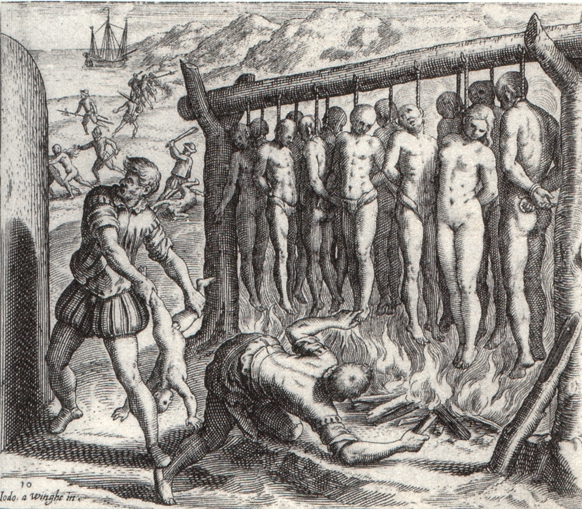
Burning of Hatuey, a Taino chieftain. From a bas-relief of the portal of El Capitolio of Havana. (Credit: Wikimedia Commons)
Every time I hear a U.S. politician making the case that this is a Christian country because our Founding Fathers were all Christians and they founded this country based on Christian values (blah blah blah), I tremble. My mind escapes to the early years of my first grade education when my teachers made sure I learned and understood the legend of the Caribbean chieftain Hatuey.
In 1542, Fray Bartolomé de Las Casas—the great Defender of the Indians—documented the first genocide of indigenous nations of the Americas in his Brief Account of the Destruction of the Indies:
The reason why Christians have killed and destroyed so many and such an infinite number of souls only because they have gold as their ultimate end, and becoming bloated with riches in very few days, and climb to very high states out of proportion to their persons, it is good to know, is because of their insatiable greed and ambition, which has been greater than it could have been in the world, because these lands are so blissful and rich, and the people so humble, so patient and so easy to subjugate.
“If demons had gold,” Las Casas wrote, “[the Spanish] would attack them to steal it from them.”[i]

“Fray Bartolomé de las Casas” by Felix Parra (1845-1919) done in 1875 on display at the Museo Nacional de Arte in Mexico City. (Credit: Alejandro Linares Garcia / Wikimedia Commons)
Whenever the Spanish conquistadores entered a new territory in the newly discovered islands of the West Indies, their custom was to stage a “cruel and notorious massacre so that those gentle sheep would tremble at them.” The lords and leading men of the tribes were burnt at the stake in “living flames.” The rest of the Indians were killed with lances, sword-thrusts, and fierce dogs. Their villages were set on fire. Those who survived were enslaved.
The chieftain Hatuey escaped from Española (what is Haiti today) to Cuba in order to remove himself and his people from the “slavery, torments and perdition” of the Spanish encomiendas. Like a heretic condemned to an auto de fe, Hatuey was burned at the stake by the Spaniards of the Diego Velázquez expedition.
What made Hatuey legendary was a brief conversation held moments before his death at the stake.
Spanish priests told Hatuey that he was to die for his rebellion, but if he repented and accepted Christian baptism, he would receive salvation from Hell and the promise of Heaven after death.
Hatuey put the question to them: “Are there Christians in Heaven?”
The priests replied that of course, Heaven was full of Christians.
Hatuey refused the offer of baptism. His logic: “I prefer to go to Hell, where there are no Christians.”[ii]
OG

Illustration from “A Short Account of the Destruction of the Indies” written by Bartolomé de las Casas (written in 1542; published in 1552). Illustration by Theodor de Bry. (Credit: Wikimedia Commons)
[i] Bartolomé de Las Casas, Brevísima Relación de la Destruición de las Indias (Madrid: Ediciones Cátedra, 2001), 78, 159. For a complete, workmanlike translation in English of Las Casas’ text, see A Short Account of the Destruction of the Indies, ed. and trans. Nigel Griffin (New York: Penguin Books, 1992).
[ii] Las Casas, Brevísima Relación, 107-108; Bartolomé de Las Casas, Historia de las Indias (México: Fondo de Cultura Económica, 1965), vol. 2, lib. III, cap. XXV, 522.
Reblogged this on malkitsinghkalsi.
LikeLike